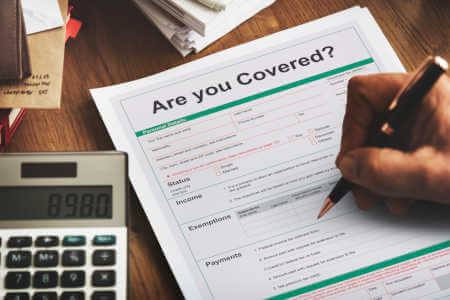Auto Insurance
What Is Auto Insurance? Automobile insurance is used to protect you from costs related to auto accidents and other types of losses, such as the theft of your car that you may not otherwise be able to afford.
Auto insurance is one of the most frequently purchased types of personal insurance. In fact, most States require that you carry liability insurance in order to operate a motor vehicle on public roads and highways.
Your car insurance policy is a contract between the policyholder and the insurance company. The policyholder agrees to pay a certain amount, know as a "premium" to their insurance company in exchange, the insurance company agrees to pay losses as defined in the policy.
Types of Auto Insurance Coverage

Auto Insurance coverage varies from State to State but for the most part, your automobile policy provides property, liability and medical coverage.
Liability coverage - Liability insurance pays for injuries you (the policyholder) cause to other drivers and damage you cause to their property when you are at fault in an auto accident.
Collision - Collision covers damage to your vehicle caused in an accident, even if the collision was your fault or was due to a hit-and-run accident.
Comprehensive - Comprehensive covers damage from other causes including theft, vandalism, fire, falling objects, or hitting an animal, such as a deer.
Medical Payments coverage - Medical coverage pays for the cost of treating bodily injury you or your passengers suffer in an accident, rehabilitation and sometimes lost wages and funeral expenses. It usually covers only medical expenses not covered by health insurance, such as co-payments and deductibles.
Uninsured Motorists (UM) Coverage - Uninsured Motorist coverage comes into play when an at-fault driver causes an accident that damages a policyholder's vehicle or injures the policyholder or their passengers and has no insurance or insufficient insurance to pay for the total loss.
Uninsured Motorist coverage helps pay for treatment of your injuries from being hit by an uninsured motorist or in a hit-and-run accident. Note: Uninsured Motorists (UM) coverage has nothing to do with property damage; it only involves bodily injury.
Under-insured Motorists (UIM) - Covers for treatment of your injuries when a driver causing an accident has lower bodily injury liability limits than your UIM limits. Insurers are required to notify you of the availability of this coverage, although buying it is optional. Note: UIM coverage has nothing to do with property damage; it only involves bodily injury.
State law sets the minimum amounts of insurance or other financial security a driver have to pay for injuries to other people or damages to other people’s property when the policyholder is at fault in an auto accident.
Most auto policies are for six months to a year. A basic auto insurance policy is comprised of six different kinds of coverage, each of which is priced separately.
Auto Insurance Requirements


Test your knowledge of Auto Insurance
Jack drives into a ditch and tears up the underside of his truck.
Which auto insurance benefit covers the scenario outlined above?
Jack hits a deer and shatters his windshield.
Which auto insurance benefit covers the scenario outlined above?
Jack loses control on an icy road and hits a jogger, sending the jogger to the hospital.
Which auto insurance benefit covers the scenario outlined above?
Ngozi is sitting at a traffic light and Issac rear ends her car, sending Ngozi to the hospital and generating a claim to Issac’s insurance company.
Which auto insurance benefit covers the scenario outlined above?
Jack hits a bus and hurts his back. Jack’s truck is fine, but Jack needs to see a doctor.
Which auto insurance benefit covers the scenario outlined above?
Brian’s battery dies in the middle of nowhere and he’s forced to pay someone to transport his truck to a service station.
Always review your policy or contact your agent to identify the limitations and exclusions of your coverage.
Related Content
Disclaimer
This website contains only a brief description of various insurance products. For specific information about a particular type of insurance product, you should consult an agent.

